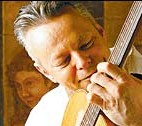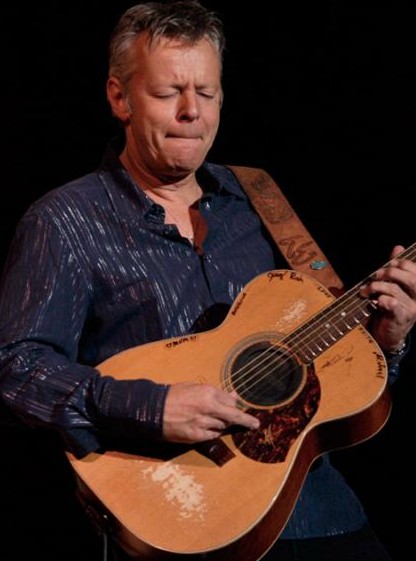Featured artist: TOMMY EMMANUEL

Australian
guitar virtuoso Tommy Emmanuel has wowed audiences the world-over
with his compositions, interpretations and finger wizardry. He
was a recipient of the Certified Guitar Player Award for his contributions
to finger style guitar. Chet Atkins called him, “One of
the greatest players on the planet.” Not since the late
Lenny Breau has there been a guitarist so comfortable playing
harmonics -- that are so difficult most of the great guitarists
don't even bother. Tommy's interpretation of Sir Paul McCartney's
Michelle, featuring an astonishing range of guitar-generated,
tender-is-the-night, percussive effects, is a sure bet for jazz
immortality.
Listen
to MICHELLE
INTERVIEW
Tommy
Emmanuel was invited back to perform two concerts at the 2004
Montreal International Jazz Festival. I spoke to him after
his second show.
Arts
& Opinion: Do you remember the first time you played Initiation
for Australia’s Aborigines?
 TOMMY:
I’ll never forget it. It was in
Arnhemland, in Australia’s Northern
Territory, which belongs to the Aborigines. I knew I had struck
a very deep ancestral chord when the crowd closed in around me
and began to dance. Even today, many years later, when they learn
I’m coming to play for them, tribal members carrying a pail
and smoking branches will come into my dressing room before a
concert to ward off evil spirits. These are always very special
moments for me.
TOMMY:
I’ll never forget it. It was in
Arnhemland, in Australia’s Northern
Territory, which belongs to the Aborigines. I knew I had struck
a very deep ancestral chord when the crowd closed in around me
and began to dance. Even today, many years later, when they learn
I’m coming to play for them, tribal members carrying a pail
and smoking branches will come into my dressing room before a
concert to ward off evil spirits. These are always very special
moments for me.
A &
O: What special effects to you use?
TOMMY:
Everybody always asks me that and I tell them I don’t use
any effects, except for a delay. And if they think they’re
hearing strange sounds it just might be their imaginations feeding
off the music -- which is a good thing.
A &
O: I know that you’re a great fan of
Lenny Breau (1941-1984) whose
formative years were spent in Winnipeg, Canada. How did you meet
him, and was it him who introduced you to harmonics?
TOMMY:
To answer your second question first, my good friend and mentor
Chet
Atkins (1924-2001) introduced me to harmonics and
later to the music of, and Lenny Breau himself. One day I was
at Chet’s and he told me he wanted me to meet this guitarist.
Lenny was upstairs playing. Even before I made it half way up
the stairs I was hearing things that were astonishing. Ten minutes
later I was sitting with Lenny who began to play harmonics such
as I have never in my life, and then I started learning right
there and then. Chet, and he mentions it in his autobiography,
always regretted that he didn’t film that session. To this
day, there is no one in the world who can do what Lenny did and
we are all indebted to his legacy.
A &
O: Is there a guitarist out there who is doing something you wish
you could do but can’t. And by the way, if there is, he
or she is an automatic candidate for apotheosis.
TOMMY:
(Chuckling). I would have to say in the genre, no. But I would
love to be able to play classical guitar or flamenco. And I’m
still and will always be working on harmonics.
A &
O: From Blue Moon to Mona Lisa, Michelle
and Somewhere Over the Rainbow. Are the standards a recent
discovery?
TOMMY:
I’ve been playing Blue Moon for years, but my love
and appreciation of the standards has definitely grown since I’ve
come to the US. In terms of melody and composition, you can’t
beat them.
A &
O: Is there an album of standards on the near or far horizon?
 TOMMY:
I would love to make that happen, just not sure when.
TOMMY:
I would love to make that happen, just not sure when.
A &
O: Audiences have come to expect showmanship and unparalleled
technical virtuosity from you. Are you concerned that they will
be less receptive to original material grounded in composition?
TOMMY:
I am first and foremost an entertainer and I have no qualms about
playing other people’s material, which is always an homage
of sorts. I want my audience to go home happy, I want them to
want to see me again. After a while you get a feel of what moves
an audience and my repertoire is diverse enough to usually accommodate
them. For example, I know you can only play so many ballads before
an audience begins to get restless. But my main concern is that
the audience gets to hear what it wants to hear and I get to play
what I love to play.
A &
O: What music are you listening to now? What music do you keep
returning to over, let's say, a 10 year period?
TOMMY:
Lately I’ve been listening to Billy Joel and Frank Sinatra.
Frank’s ballads are simply beautiful. Over the longer period,
I keep coming back to Chet Atkins and Lenny Breau.
A &
O: Chess masters claim they begin to lose their edge, their sharpness
if they don't play for 3-4 days? How many days can you go without
playing before you begin to lose it?
TOMMY:
If I don’t play for a couple of weeks, I’ll notice
my fingers are not obeying all of the instructions sent from my
brain, but I rarely, and I mean rarely go 2 weeks without playing
guitar. Forcing myself not to play is the more likely challenge.
A &
O: You look like you look after yourself, your health, that your
not comfortable in the fast lane. Is this a consequence of fame/celebrity
coming late in life?
TOMMY:
I respect life too much not to look after myself, and I learned
quite early in life how to handle celebrity. I feel very privileged
to be living the life I’m living: I’m in a wonderful
relationship, audiences are receptive to my music which has allowed
me to travel all over the world and experience different people
and different cultures. There is so much to see and do and learn
and discover and never enough time which is why I’m doing
my best to live a clean and healthy life so I can take advantage
of what life has to offer for as long as I can.
A &
O: Thank you, Tommy, and hope to see you back in Montreal soon.
TOMMY:
Love to come back. I could have played for you people all night.
You were a great audience.